 Petzlover
Petzlover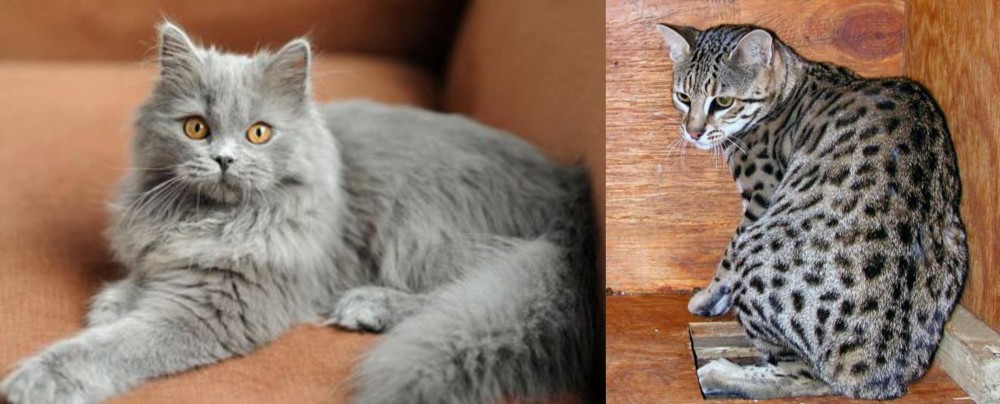 British Semi-Longhair is originated from United Kingdom but Safari is originated from United States. Both British Semi-Longhair and Safari are having almost same weight. British Semi-Longhair may live 6 years less than Safari. Both British Semi-Longhair and Safari has same litter size. British Semi-Longhair requires Moderate Maintenance. But Safari requires Low Maintenance
British Semi-Longhair is originated from United Kingdom but Safari is originated from United States. Both British Semi-Longhair and Safari are having almost same weight. British Semi-Longhair may live 6 years less than Safari. Both British Semi-Longhair and Safari has same litter size. British Semi-Longhair requires Moderate Maintenance. But Safari requires Low Maintenance
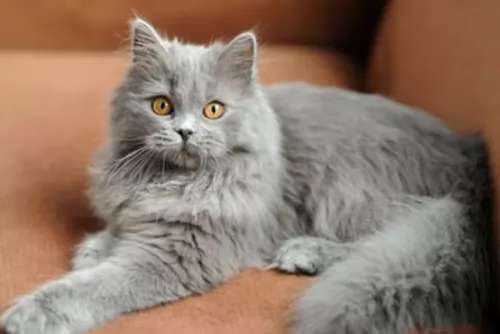 The British semi-Longhair cat is exactly like the British Shorthair except when it comes to the coat length - the hair is longer.
The British semi-Longhair cat is exactly like the British Shorthair except when it comes to the coat length - the hair is longer.
During the 20th century, a short-haired version of the modern Persian was developed and it was then proposed that a long-haired cat of the British type make it into the cat fancy.
The British Shorthair cat was bred with different Persian cat breeds which then resulted in a cat that looked like the British Shorthair cat, just with longer hair. It is recognized separately in the United States of America but considered one and the same as the short hair in the United Kingdom.
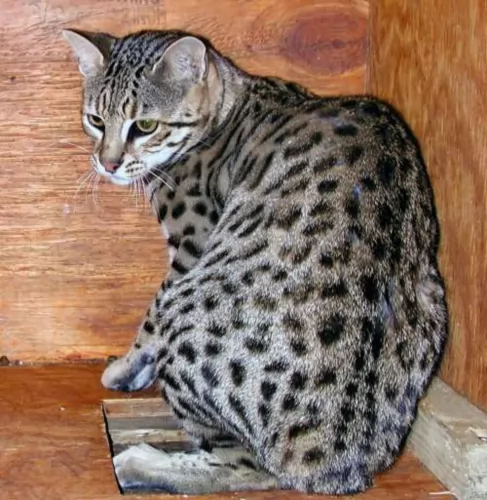 The Safari Cat, hailing from the USA, is one of the rarest breeds of cats. There are only about 70 of these cats registered at the International Cat Association.
The Safari Cat, hailing from the USA, is one of the rarest breeds of cats. There are only about 70 of these cats registered at the International Cat Association.
The Safari cat is a mix of a moggy and Geoffroy's cat. At first, the cat was used for research purposes by Washington State University but then cat breeders took over the development of the breed.
The name ‘Safari’ was chosen because of its wild look.
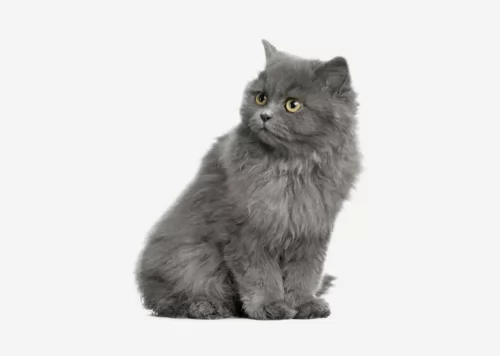 The British Semi-longhair can become quite a large cat really and is described as a medium to large cat. In fact, a full-grown British Semi-Longhair can grow to be about 7.5kg in weight.
The British Semi-longhair can become quite a large cat really and is described as a medium to large cat. In fact, a full-grown British Semi-Longhair can grow to be about 7.5kg in weight.
They’re compact and robust with short, strong legs. The longish coat can be in all colors and patterns and he sheds moderately. Color can be white, cream, chocolate, blue and colors can be solid, ticked or bi-colored.
The ears are wide-spaced and medium-sized and they eyes are almond-shaped and match the color of its coat.
The British Semi-Longhair cat is such an easy-going pussycat while being reserved, independent and undemanding. He will get on with children and other pets in the home. Perhaps he suits someone who loves the idea of having a gorgeous pet around, but who is working and doesn’t have that amount of time to devote to a cat.
The British semi-longhair is one of those cats that doesn’t mind too much if you disappear to work each day. He can amuse himself without you during that time, as long as he has some nice toys and a nice environment to chill.
It’s not the kind of cat to follow you around, making it perfect for anyone who doesn’t have the time to give the cat too much attention. It’s simply not a lap-cat.
The cat isn’t very active at all and is more than happy to sit in his favorite spot in the sun and to watch activities from there. This is a quiet, content cat, not wanting to meow unnecessarily and his round face shows off a happy disposition.
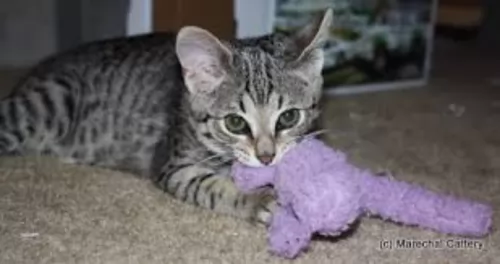 The hybrid Safari cat is a medium to large-sized cat that at first weighed in the region of 15kg, but the cat now weighs roughly 11kg.
The hybrid Safari cat is a medium to large-sized cat that at first weighed in the region of 15kg, but the cat now weighs roughly 11kg.
Its body is much like that of the wild parent, the Geoffroy – muscular and compact. The ears aren’t particularly large and are smallish, rounded ears with a fairly broad head.
It has a typical wild cat look and is a spotted or rosetted cat breed. Below the spots, the coat is a silvery grey shade.
The coat which is short actually comes in a variety of colors that come from both cat breeds. The eyes of this cat are either yellow or green. The Safari cat certainly has a wild cat appearance, because of the cross-breeding. This is a rare cat and because of this, there is no breed standard for it.
They can live to be between 17 and 20 years of age.
Even though one of the parent breeds is a wild cat, the Safari cat is described as an easy-going cat that can make a good pet.
The cat is very intelligent and playful and will enjoy swimming and climbing. It is for this purpose that he needs to have quite a large outside enclosure with a pool of sorts so that he can paddle.
There isn’t much information on their interaction with children and other pets in the home. While they are quite likely to make good pets where there are children, there would have to be supervision where there are small children. During play, these cats can bit. It would be extremely important to teach children to respect any animal and to be gentle and kind to them.
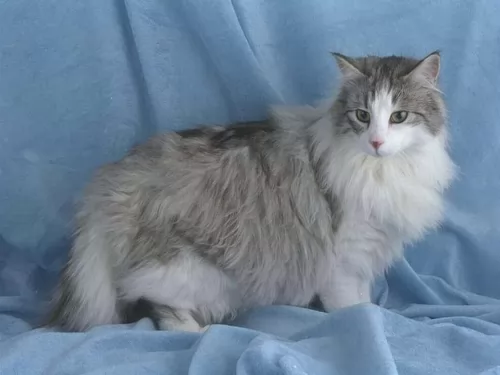 This moderately shedding cat is such a balanced cat – it is good with everyone, is quiet and unassuming. It just quietly gets on with life, being content and satisfied with its lot.
This moderately shedding cat is such a balanced cat – it is good with everyone, is quiet and unassuming. It just quietly gets on with life, being content and satisfied with its lot.
If you’re looking for a more ‘involved’, vocal, active cat, the British semi-longhair isn’t for you. If you however, want a quiet, steady presence in your home, this lovely cat is for you.
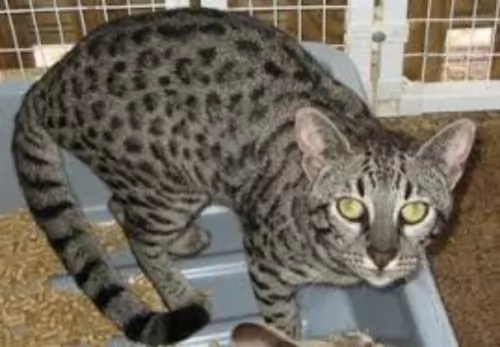 As a hybrid cat, your Safari is interesting alright, but unfortunately, you can’t ever be 100% sure of a hybrid cat. It needs careful consideration before you bring one into your home.
As a hybrid cat, your Safari is interesting alright, but unfortunately, you can’t ever be 100% sure of a hybrid cat. It needs careful consideration before you bring one into your home.
Apart from coming into the home from time to time, hybrid cats need an outside enclosure too that is securely fenced and gated and with a roof.
You made a decision to buy a cat with a wild side. It may live up to all your expectations but it may not either.
When you do research you find that the biggest number of behavioral complaints from owners of hybrid cats are about aggression issues and the refusal to use a litter box when indoors.
There is still a raging debate going on as to whether hybrids make suitable pets, but when you bring any animal into your home, as a responsible adult it is your job to provide well for it to ensure its happiness.
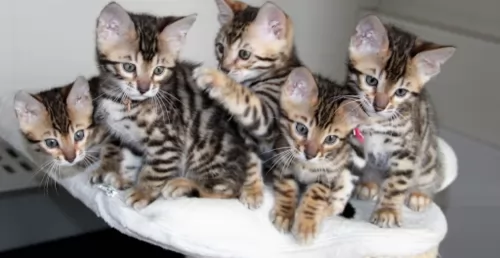 The Safari cat isn’t a particularly well-known breed so there isn’t much information on their health. They can suffer from the same illnesses as non-hybrid domestic cats.
The Safari cat isn’t a particularly well-known breed so there isn’t much information on their health. They can suffer from the same illnesses as non-hybrid domestic cats.
Certain hybrid breeds, such as the Safari, can sometimes have issues with reproduction as some cats are infertile. Domestic cats and wild cats have a different number of chromosomes and this results in reproductive problems, and stillbirths are quite common.
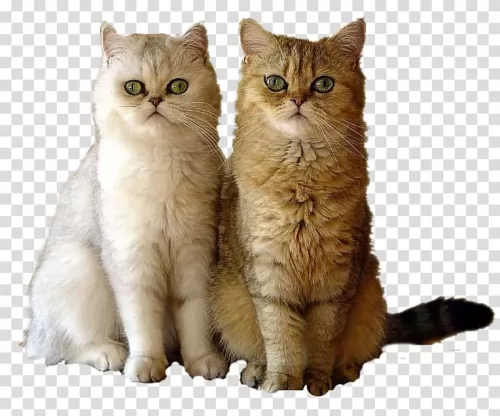 Because of the semi-longhair, the British Semi-Longhair will require more effort than short hair cats with keeping the coat free of tangling. It’s a good idea to get this cat used to a brush-session to free the coat of dust and loose hairs at least once or twice a week.
Because of the semi-longhair, the British Semi-Longhair will require more effort than short hair cats with keeping the coat free of tangling. It’s a good idea to get this cat used to a brush-session to free the coat of dust and loose hairs at least once or twice a week.
Other basic grooming requirements for your kitty kat would be to keep the claws short, to check inside the mouth for dental problems, to check inside the ears for dirt and redness and to check the eyes to make sure they’re bright and clear. If there is a discharge, wipe the eyes gently with warm water and some apple cider vinegar. Be very gentle with all your grooming processes for your cat.
The British semi-Longhair enjoys his food and if you don’t feed him in a responsible manner he can become obese. He is such a beautiful cat this that you want to ensure he gets the best premium quality food there is – food that is high in proteins.
It’s not worth feeding your beautiful semi-longhair on inferior foods as this can impair his health.
Cats are carnivores – related to lions – they’re meat-eaters. As far as their diet is concerned, they need fats and proteins and not carbs.
When you’re choosing food for your British semi-Longhair, check out the label to make sure you know precisely what your cat is taking in. When you are 100% sure that the food is the best it can be and your cat loves it, give it to him.
Don’t change foods haphazardly, as this cat likes a lifestyle devoid of sudden changes. If in any doubt, get advice from your vet on weight and calorie intake for your pet.
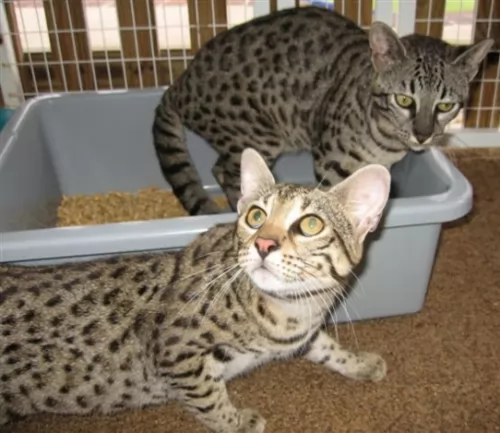 It is recommended that you brush this cat each week. He isn’t a big shedder but the brushing once a week keeps the fur in good condition, removing loose hairs and dust.
It is recommended that you brush this cat each week. He isn’t a big shedder but the brushing once a week keeps the fur in good condition, removing loose hairs and dust.
A high protein diet is imperative. Cats are carnivores and a meat diet is imperative. You can speak to your vet or a cat expert about feeding your Safari cat. Certainly, they need to be fed high-quality cat food. These foods are available in wet and dry form.
He will definitely need some raw meat. Make sure you understand the ingredients in some low- quality cat foods as corn for cats can be a problem for them, hard to digest and it could cause intestinal problems.